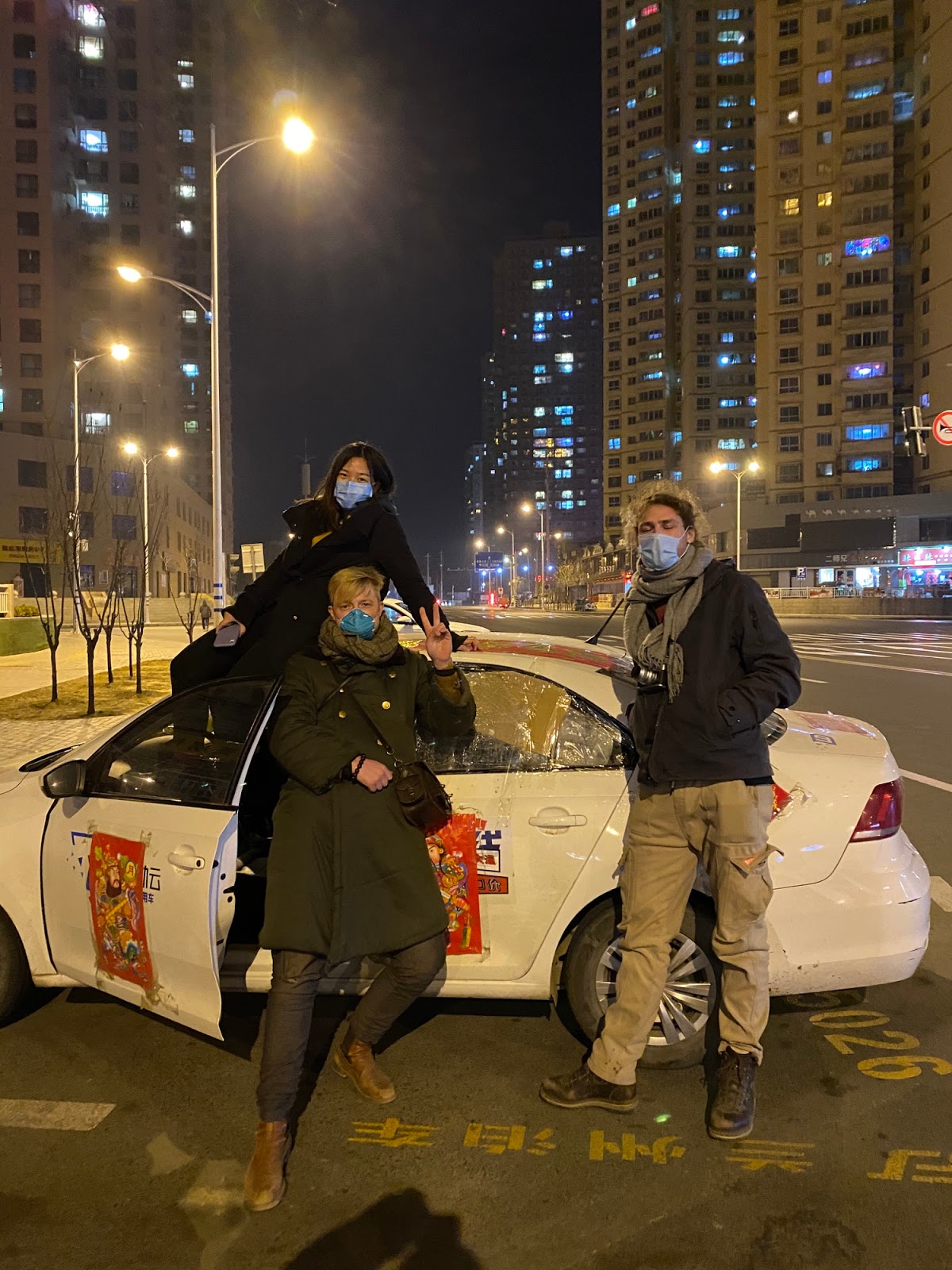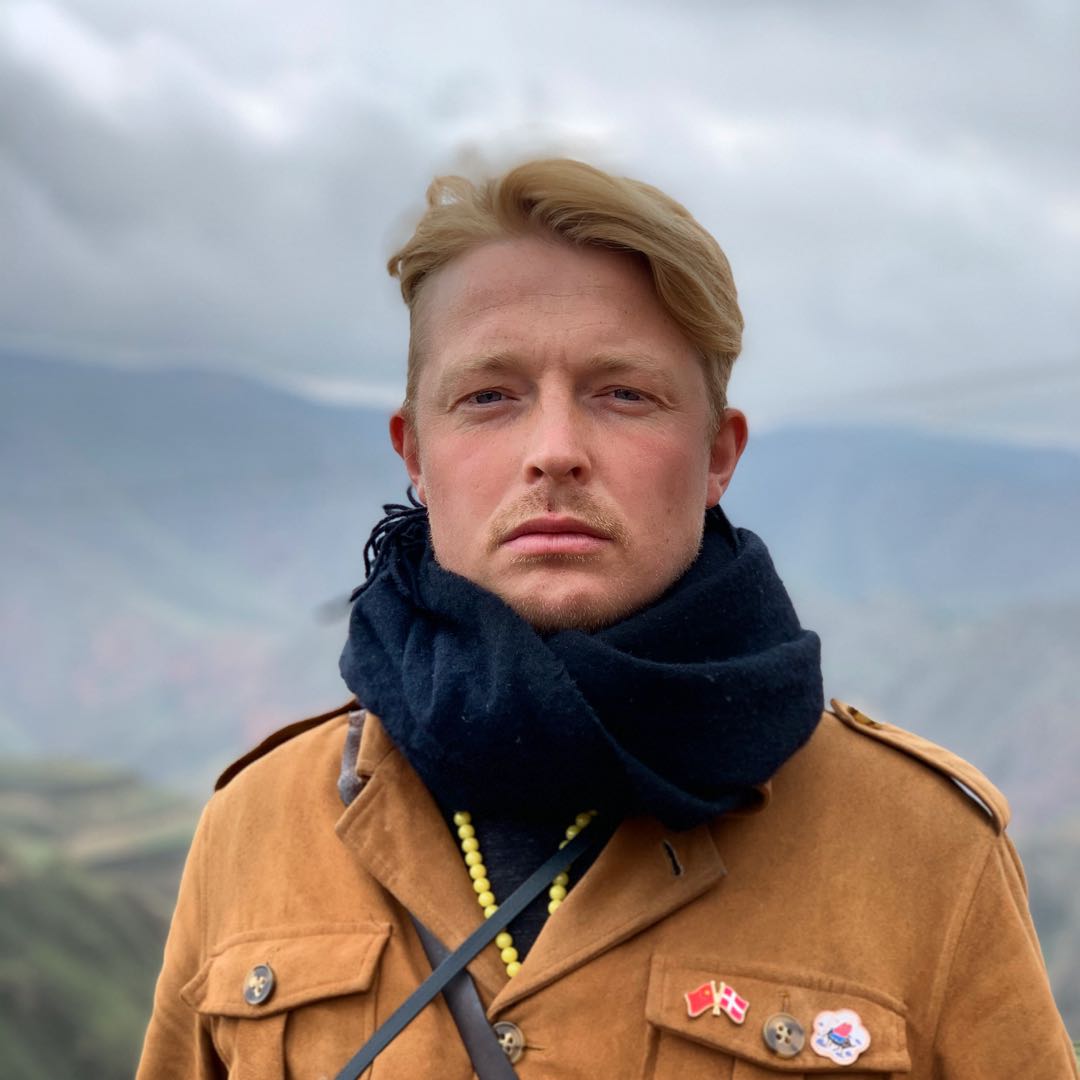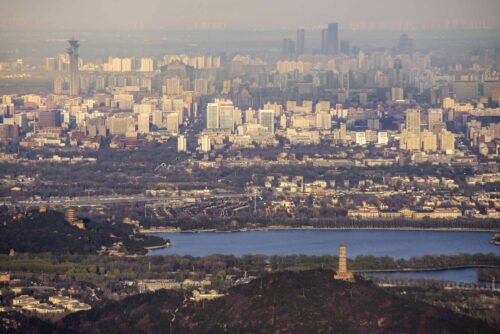Road-tripping through fear, rumors, and a virus-stricken China

Our correspondent received grants from two Danish foundations to road-trip through the mountainous terrain of Sichuan, the highlands of Gansu, the deserts of Ningxia, and steppes of Inner Mongolia in January to conduct research for a musical project called “Songs of the Chinese Frontiers.”
And then the coronavirus hit.

“If you go north, I am not sure you will make it to Beijing,” he said.
I’ve had people doubt my choice of routes through China ever since my first walk through the hutongs of Beijing. They doubted me when I traveled by motorbike from Guangxi to Beijing, and again when I hitchhiked from northern China to Henan Province. Usually I just shrug it off and go ahead anyway.
But since he was the mayor of Lanzhou and Baidu Maps was showing 1,545 kilometers (960 miles) between us and the Chinese capital, I pondered what other options were on the table. Complicating things, my contacts in Ningxia and Inner Mongolia had already told me to stay away, citing local government directives warning people to keep indoors and avoid contact with other people. Especially outsiders.
Three days prior to our arrival in Lanzhou, we were made aware of the panic that the “novel coronavirus” — now called COVID-19 — was beginning to stir around the country. When we heard that Wuhan was locked down, I was still deep in the mountain steppe areas of the Sichuan-Gansu border region. Domestic yaks and Tibetan herders seemed oblivious to this disease, but we knew it was getting serious.
Together with a classically trained guitarist from the Royal Danish Conservatory of Music and a photographer from the Communication University of China (CUC), we were on a road trip to collect snippets of folk music in minority areas. We had stayed two nights in the personal quarters of a Lamaist Tibetan monk before altitude sickness and the cold forced us to go to a local hotel in the nearby village.
The monk had smiled and laughed good-naturedly as we relayed the news of the increasing number of infected and dead, updated by the hour by various media outlets. “If you think clearly and trust in Buddha, you will make it through this,” he said, producing three orange scarfs that he hung over our heads and placing porcelain bowls and apples in our hands. “These will protect you on your way.” I gave him one of the 20 N95 masks that I had purchased in Chengdu. I gave another five to a Tibetan family that was on their way to Chengdu to visit a relative who had fallen ill.
I woke up just as the sun rose over the highland steppes and sent beams of piercing light through the wide windows of our hotel room. The room was hot as hell — “the warmest hotel in the whole village,” we had been promised. It more than lived up to expectations. “The virus will peak in the middle of March,” a Facebook post told me. For a moment, I considered waiting out the virus in the hotel, 3,500 meters above sea level. At a room rate of 210 yuan ($30) per night, we were looking at a ballpark estimate of more than 12,000 yuan ($1,700) for about two months. Both the guitarist and the photographer had been suffering from headaches and dizziness over the past couple of days — side effects of altitude sickness…I hoped — so I knew a prolonged break would cheer up the group.
But the Sichuan police made the decision for us. As I was in the lobby scouring our options for the day, two officers in drab black uniforms and blue masks fired questions at me: “Where did you come from? What are you doing here? Where are you going?”
The sight of the masks surprised me, since we had only seen them in news stories online. The Tibetan lobby boy was not wearing a mask, nor were the droves of visiting monks rotating between the hotel and the nearby temple to pray. “We came from Chengdu by car, we are here to perform, and we are on our way to Langmusi,” I replied.
The officer said in a calm but firm voice: “Leave the village today. A student has fallen ill after returning from Wuhan. If you are going to Langmusi, leave as soon as you can and register immediately as you get there. Do you understand?”
Before the hour was up, we had left the city, only stopping to buy some traditional Chinese medicine for the guitarist and photographer.
“You won’t make it to Beijing. The city will be sealed off before you get there. Now take care, safety first!”
The picturesque alpine town of Langmusi on the border of Gansu and Sichuan turned out to be as empty as a ghost city. Missing only the tumbleweeds. I had phoned a Hui Muslim guesthouse owner that I knew from a previous visit, and while he at first welcomed us to his house, I subsequently received a call from his son telling me to go somewhere else. The son said he was protecting his family from face-to-face contact with visitors.
Our car ascended a concrete ramp to the Langmusi police station. A police car happened to be passing by, with the two officers inside flabbergasted by the sight of three mask-wearing outsiders in their city. The crowd of officers who had just sent off their colleagues stood at a safe distance as we approached. None of them were wearing masks. Two of the officers covered their mouths with the top of their open-buttoned jackets when we got out of the car.
“Stop! Stay back!”
“We don’t have the virus, we are only wearing the masks for protection,” we said.
After another round of questions about our destination — and repeated inquiries of our comings and goings, making sure we hadn’t been in Hubei — the police photographed our passports and let us go, with no guarantees that hotels would be able to take us in. A sturdy backpacker café was one of the only establishments still keeping its normal operating hours, so we settled in for a cup of coffee. After we placed our orders, the phone rang. “Stay where you are. Do not move, understand? We are from the health clinic and we are coming over.”
“Don’t worry,” the Hui muslim waitress said. “No viruses can get up here. We are safe, people are just playing it up.” After three Chinese-bean Americano coffees were placed on the table, three people wearing white full-body disposable plastic suits burst in.
“Do you have a fever, do you feel dizzy?”
We said no — this was true about the fever, anyway. They proceeded to produce three old-school mercury thermometers and instructed us to put them in our armpits.
“37.2, you’re fine,” they said. “Be careful on your way north and stay away from the small villages.”
Later, I was informed that personnel in Gansu had been instructed to take people with temperatures of 37.4 C and above for further testing. It felt like we had provoked the town into action. Nobody would take us in, and while the police and the medical staff were helpful, the only advice they had was: “Leave the city and head back home, wherever that is.”
As we left the city we saw police officers barricading the only road in and out of Langmusi. The last advice we received was to make for Luqu, a bigger city in the area, where we could find a place to stay for the night. We drove through locked-up towns against the backdrop of dusky mountains.
Pulling into the Luqu city limits, we were met by flashing police lights and a dozen or so neon-green-vested police officers bringing cars to a halt. Doctors in white full-body suits gestured for folks to roll down their windows so they could aim thermal thermometer guns at people’s foreheads.
“Foreigners!” a doctor with goggles shouted when they got to us. A police officer came running and directed us to park the car. “Get out of the car. Come with me to the tent for temperature screening.”
The tent was warm. A stove was burning in the middle, and gas masks, instant noodles, and medical equipment was strewn around field mattresses along the sides of the tent. “Are you going into the city? You really should be leaving. Go back from where you came!” This familiar suggestion had become a nuisance for us by then. After going through the process of listing all the places we’d been since Chengdu, the police agreed to ask around in the city for an open hotel.
But a tech blunder of epic inconvenience kept us grounded: the car doors of our Chengdu-rented, app-controlled Volkswagen GTE suddenly wouldn’t open. Customer service acknowledged that there was a bug in the system and that they had experienced this before. The best they could offer was: “Do you have a dog in the car? Maybe you can get the dog to open the door from the inside?”
A police chief with stars on his collar entered the tent where we were huddled, and right away all of his subordinates stiffened up and sought to be on their best behavior. Everyone, despite wearing substandard masks, seemed to understand the gravity of the situation, except for one curious, ersatz-gold-wearing tuhao villager darting in and out of the tent puffing Shuangxi cigarettes. Meanwhile, a medical worker was trying to solve technical problems with the thermal guns by holding them over the flames of the stove.
“What are the foreigners doing here?” the police chief asked.
“They locked themselves out of their own car,” an officer answered. “These days, technology is too modern for when the going gets rough. Aiya!”
“It’s not too bad,” another officer said. “At least if you get a cold up here you can go to the hospital for free now!” Everybody laughed. “Can we take a selfie with you?” We leaned in.
Customer service called us back and instructed us to shatter the rear passenger window. They would cover the costs, they promised. The policemen began arguing about the best way to do this, and eventually offered a baton, but not their assistance. This was our responsibility, so we had to do the deed.
We did it haphazardly, with a roadside rock, a police baton, and five hard punches. I gave a N95 mask to the leading doctor and one to the police chief. “I only want them if they are new,” the doctor said. I assured him they were.
The police dispatched a squad car to escort us to a hotel in the city. Sending us off, the police chief said ominously: “You won’t make it to Beijing. The city will be sealed off before you get there. Now take care, safety first!”
“We got used to all of this during SARS. Don’t worry, it’ll all be OK.”
The next day, we drove the roads of Gansu toward Lanzhou. We picked up a Tibetan woman who was hitchhiking back to her village, and she invited us to her house. At the gate of the village we were met by villagers armed with sticks and clubs who demanded us to leave. The woman apologized before quickly disappearing into the village.
We zipped down the empty highways of Gansu, through the imposing brown and yellow loess hills dotted with gilded mosque minarets around China’s little Mecca, Linxia. We arrived in Lanzhou within a mere hours.
Our photographer’s best friend and classmate from CUC happened to be the daughter of the Lanzhou mayor, so we were invited to indulge in homemade Lanzhou delicacies in their high-rise apartment on the north bank of the Yellow River.
A rerun of the CCTV Spring Festival Gala was playing from a 60-or-so-inch television. We were treated with the utmost hospitality to mutton soup, boiled pigs feet, meatballs, pork ribs, and frozen pears. The mayor was taking calls throughout the meal, with one eye on the TV and another at the dishes. “OK, I see. We’ll handle it, don’t worry.”
I knew from media reports that there were 12 cases of coronavirus in Lanzhou when we arrived. “They are all over there,” the mayor’s daughter said, pointing out the window to a building on the other side of the river. It seemed bizarre to be faced with the reality of the virus over frozen pear and mutton soup.
“You really should go through Shanxi and Hebei to Beijing — or back to Chengdu!” was the last piece of advice the mayor had for us before we left. “Don’t travel via the northern route.”
After another evening at the police station and getting turned down numerous times by hotels and guesthouses, we found a place to stay in the outskirts of Lanzhou before continuing on to Ningxia the next day. The loess turned into sandy clay hills. On the Gansu-Ningxia border we were stopped for the now-routine thermal thermometer inspection. “Open your trunk,” the border guards commanded. “People have been hiding in the trunks to get through the checkpoints. Are you sure there are no more people in your car?” They looked through the trunk only to find a stash of guitars, noodles, chocolates, and Red Bull.
Yinchuan was a ghost city as well, and except for apologies from my contacts that we would have to postpone our planned dinner, there was no one to see or talk to. We arrived late in the evening, and my guitarist friend and I took a stroll through the deserted Ningxia metropolis. What few cars there were would slow down to a near stop when they came upon us. I could only imagine how we looked to them, a couple of ragtag foreigners strolling through a ghost town.
The next day, we drove to Inner Mongolia. Cutting through the Ordos Desert dunes just south of the northern bend of the Yellow River, we passed huge coal power plants in the desolate gray landscape. They puffed towering columns of smoke toward the blue sky on the border of the desert and steppe.
Gradually it grew foggy and the trees along the highway began to turn white with frost. Everyone we met on the roadside resting areas were attempting to return home, wherever that may be. All the highway exits, except for those leading to the bigger cities, were blocked with plastic sandboxes. We reached Hohhot and a guesthouse that a Beijing-based friend of ours had helped us locate.
A Chinese woman hanging out by the reception desk asked us if we wanted to join her for dinner with her family. Defying quarantine advisories, we followed her to her house, where her husband cooked dinner for us. “We got used to all of this during SARS. Don’t worry, it’ll all be OK,” she said.
Just the day before, I had initiated a call for mask donations from Denmark, partly as a response to the debacle over a satirical drawing that appeared in the Danish newspaper Jyllandsposten. “You’re doing a good thing. There is no problem here, but Hubei needs all the help they can get,” our host said. We performed a couple of songs for the Hohhot family before we rested and made ready for the last day of our journey.
The drive into Beijing was surprisingly smooth. Two soldiers behind a wall of glass scrutinized us with suspicion before waving us through. The rumors about the capital being sealed off turned out to be unfounded.
After 2,500 kilometers (1,600 miles), 15 checkpoints, and countless temperature screenings, we had reached Beijing. We swung the car into a parking lot just on the corner of an intersection close to the Drum and Bell Tower.
The guy who came to pick up our car to take it to the rental company pointed to the shattered window, the remaining shards held in place only by cardboard from a box of cup noodles and several meters of duct tape. “What do I do if the police asks how this happened?” he asked.
“Tell them their colleagues in Gansu have us covered,” I said. He drove away and I have not heard from the company since.
I slept well into the next day and was only awoken by a loud and insistent knocking on the door of my hutong apartment. “We are from the Dongcheng Health Committee. All returnees are required to undergo house quarantine for two weeks,” a voice boomed. “We have placed two forms on your doorstep. Fill them out and leave them outside when you are done.”
“Welcome back to Beijing!”







